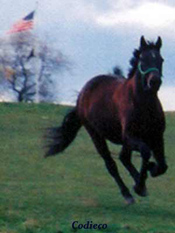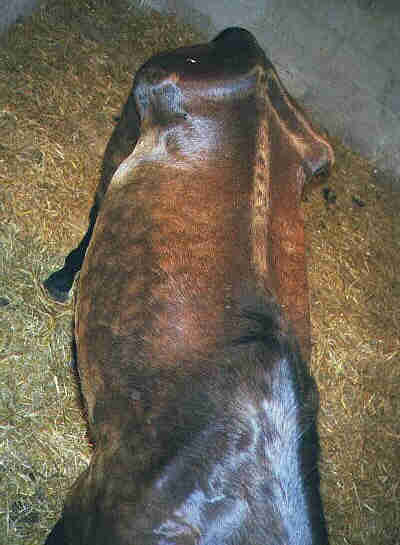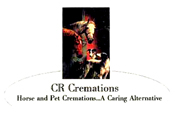
Join the EPN Announcement Only Mailing List
Support the EPN
Shop for CD's at CDRush.com & the EPN Benefits!
Put "EPN" in the Coupon Code box when you place your order.
Now you can save money on your favorite music and help the horses at the same time!
General
Press
Horse Slaughter
Horse Transport
Horse Cruelty
Legislation
State Horse Statutes
Stolen Horses
SiteMap
Horse Rescue
Rescue Stories
Turning Copper Into Gold
July 1996
Mare is Saved From Auction-Scored a Minus 1 On the Henneke Chart!

The Miracle Mile
July 1990
Pregnant Mare Foals Hours After Rescue From Slaughterhouse-
Foal is a Stakes Winner!

The Horse That The Killers Refused to Bid $5.00 On
July 1999
Emaciated and Sick Gelding Is Saved From Auction!
No charges ever filed...

Links
California Voters "Just Say Neigh" to Horse Slaughter!
HoofPAC

Shop online at IGive.com with over 600 great stores you know & love- including Back In the Saddle! Up to 26% of the purchase price is donated to the EPN!
The EPN gets $5 extra the first time you shop!
PayPal accepts credit cards! Please send your tax deductible donation to the:Equine Protection Network, Inc.,
P. O. Box 232, Friedensburg, PA, 17933.
Shop for CD's at CDRush.com & the EPN Benefits!
Put "EPN" in the Coupon Code box when you place your order.
Now you can save money on your favorite music and help the horses at the same time!
HoofPAC is the political action committee that has been formed to end the slaughter of America's horses. Cathleen Doyle, founder of HoofPAC, led the successful Save The Horses campaign in 1998 that made the slaughter of California's horses a felony.
Contact the EPN
Private Horse Cremation

CR Cremations guarantees that each cremation is private.
Charles and Kathryn Rohrer
Phone and Fax: 717-687-6940
Horse & Pet Cremations since 1994
690 Strasburg Road,
Paradise, PA 17562

Support the EPN by Shopping at IGive.com and by Searching the Net Using GoodSearch.com!
Horse Rescues
Alternatives To Horse Auctions
Finding A Home For Your Horse
The life of a horse is told in the classic story, Black Beauty by Anna Sewell. For people unfamiliar with the story of Black Beauty here is a brief synopsis.
Black Beauty is well bred and well cared for on a lovely estate. But due to a family illness he must be sold. His owner finds a buyer whom he believes will provide a good home for Beauty. The overall management is good. Beauty is well fed, his stall is clean, and he is well groomed. The new owner’s use of certain equipment would be unacceptable to the previous owner, but all things considered, Beauty is in a good home.
Beauty does well there until he is injured. Now he must be sold again. But this time he has an unsoundness. So Beauty takes a step down in value. Beauty goes through a series of owners, some good, some not so good. Beauty is sometimes starved and beaten, and sometimes he is loved and well cared for. His owners have different reasons for needing to sell Beauty. A death in the family; family illness; Beauty is no longer able to do the work expected; a novice owner who is not prepared for horse ownership, etc.
But every time he is sold, he keeps taking a step down. Beauty keeps getting older. Beauty's usefulness keeps diminishing. Beauty's breeding and accomplishments, including saving more than one owner's life are not important to his current owners who have no use for him any longer. The only people who have a use for him, who can profit from him, are the meat men. The last time he is offered for sale a man who knew Beauty in his prime recognizes Beauty and saves him from the knackers. A happy ending for Black Beauty.
But every week at horse sales all around the United States and around the world, the story of Black Beauty is played out. Only for several million horses, including Excellor and Ferdinand, there was no Joe Greene to bring them home. Instead they were forced with electric cattle prods and bullwhips into overcrowded double deck cattle trailers for their last ride to a horse slaughterhouse to be slaughtered for human consumption.
Money won, championships earned, numbers of stakes winners and/or champions produced or sired, or years of faithful service entertaining children did not earn those horses a peaceful end.
Only a horse's owner can insure that their horse is well treated and does not fall into bad hands or end up at a horse slaughterhouse. Accomplishments mean nothing when a horse is no longer useful to the current owner.
Until a horse's owner is at the end of the lead shank when the horse hits the ground for the last time, horse owners are not going to face the reality of what we, as an industry, are doing that is creating horses that are fodder for the slaughter industry at the average age of 7- 11 years old.
So what are the options for owners who can or no longer wish to keep their horse, but who want to insure the horse has a good home?
Options for Horse Owners |
||||||
Sell |
Lease |
Donate |
TB RaceHorse Donation Programs |
Retirement Farms |
Give Away |
Euthanise |
Sale or Lease
Contact Pony Clubs and 4-H groups whose members may be interested in leasing a horse. Often in Pony Clubs a horse will never leave that club, instead as the current rider gains experience, the horse will be passed on to less experienced members.
Evaluate the facility where the horse will be stabled . The level of care and outlook on how the horse is treated will depend greatly on the groups’ leaders.
Owners can be creative with a lease. Owner pays all or part of:- Vet
- Farrier
- Dentist
- Deworming
- Set amount each month
- Portion of board
The horse can be put on a sanctuary's or a retirement farm's waiting list and leased until an opening becomes available. The owner does not have the financial responsibility for the horse while arranging a permanent retirement home.
Lease or Adoption Agreements
- What makes a contract legal and binding in your state?
- Does payment have to be made to make it legal?
- What age must a person be to enter into a contract?
- Mental capacity of persons involved?
- Proof that the lessor owns the horse?
- What is the level of care that you require for your horse?
- Examples- stall or shed, turnout-individual or group (important for horses with limited sight or lame horses.)
- Bedding-important for heavey horses.
- Shipping- does the horse require a single stall or a stall and a half?
- Medication-does the horse require certain medications?
- Feed- does the horse require a certain feed to do well? Senior feed for horses with worn teeth.
- Shoes-does the horse need corrective shoeing?
Blanketing-Is it necessary to blanket the horse? - Medical care-decide with lessee about medical care-colic surgery, founder and other extravagant expenses.
- Use of horse: Examples- lesson horse, carriage horse (for hire), livery stable, pony rides, nurse mare, jump mare, teaser gelding, surrogate mother, (embryo transplants), showing, foxhunting, camp horse, racing etc.
- Specify who is to ride the horse, such as the lessee only, lessee's instructor or family members etc. This is to prevent the whole neighborhood from riding the horse.
- If the horse is going to be moved from the original approved facility the new facility must be approved by the owner.
Insurance
Mortality insurance is important when the horse has a high monetary value. Liability insurance is important because of the damage a horse may do. The owner of the horse must be in the same position in terms of potential lawsuits by other people as he would if he had sold the horse. The lessee should check with their homeowner's or umbrella policies to know if these policies would provide liability coverage.
Inspection
The ideal method of checking on a horse's condition is to personally visit the horse. This is not always practical. One method is to require photographs of the horse with the same child, (children grow). A statement from the lessee's vet, on the vet's letterhead, that the required vaccinations, deworming, dental and hoof care have been performed and the bills paid is a must. A follow-up phone call to the vet is a good idea to ensure the validity of the statement. Letterheads have been stolen.
Within 24 hours of the horse's death the lessee must contact the owner followed by a letter from the lessee's vet certifying that the horse is dead, and the cause of death. It is recommended that the lessor pay for the vet as the vet is now working for the owner of the horse. This can be negotiated.
The reason it is important to have a vet's certification is to prevent the lessee from telling the owner that the horse is dead, when in fact the horse has been sold. We have had experiences like this, so it is very important that a vet certify the horse dead.
Penalty Phase
The lessee agrees if they break the contract they will pay the owner one thousand, $1000.00, or the fair market value of the horse, whichever is greater. This prevents the lessee from profiting from the sale of the horse. This has been upheld in court in PA.
Retirement Farms
When choosing a retirement farm owners must choose if they want a personalized facility or a large turnout with little personal care. The care a horse requires now will change as he grows older. Many larger farms are not interested in caring for labor intensive horses. Smaller farms tend to have higher board rates than larger farms because there are less boarders to cover overhead costs. Overhead includes, facility and equipment cost and maintenance, taxes, insurance, supplies, feed, labor costs, and a profit. The board rate must cover all of this. Ridiculously low board rates should be questioned. The horse's welfare is at stake.
Giving Horse Away
The EPN does not recommend giving horses away. Historically horse owners have given companion or limited use horses away for free with the promise of a good home. There are too many greedy and uncaring people in this world to risk the welfare of your horse by engaging in this practice. It seems to be human nature though to take the easy way out. It is easier to believe the horse is doing fine than to go and check on the horse and discover that the horse has been disposed of or is in bad shape.
Euthanasia
The decision to put a horse down is never easy. The reality is that there are not enough homes for all of the pasture sound horses. The risk of your horse falling into a bad situation and or being sold for slaughter is a very real possibility. Death by humane euthanasia is preferred than a slow downward spiral that ends at a slaughterhouse.Disposal of the horse's body:
- Burial is it legal to bury my horse in PA?
Check with your township for ordinances against burial of horses. Request a copy of the ordinance against burial. Often a township employee has no idea of the existence or the lack of an ordinance. To be on the safe side the employee tells the horse owner it is illegal.
Frozen ground - As long as backhoe operators can dig graves for cemeteries, they can dig graves for horses. The ground digs the same for a horse grave as it does for a person's grave.
- Cremation-Penn State, PA Department of Agriculture Lab in Harrisburg and animal cemeteries have crematoriums. Check to see if they accept horse.
- PA Rendering Companies
- In foxhunting country foxhunting organizations may have a person available to shoot horses. The body may then be fed to the hounds or disposed of in another manner.
Mr. J. Brown- 610-255-4311 or Mr. Taylor- 610-458-8750.
Evaluate Your Horse
Consult with your veterinarian and farrier for an objective evaluation of your horse's soundness and use limitations.
Evaluate Facility
- Stalls- bedding material, ventilation, and stall openings important to heavey horses.
- Size of stall, flooring, bedding material, cleaning, ventilation
- Stalls open to outside or center aisle
- Shed Size
- Number of horses per shed? (Extension agents recommend 150 square feet per horse.)
- Width of entrance
- Bedding
- Cleaning
- Shed opening should face south. Sheds should be bedded. Horses urinating in unbedded sheds do not make the shed a very comfortable place for your horse to escape the flies, seek shade, lie down, or seek protection from storms. Horses lying on the cold ground lose body heat more rapidly than horses on bedding. What shelter is offered to the horses who do not get into the shelter? According to Tuft's University horses cannot comfortably maintain their body heat when they become wet and the temperature is below 50 degrees.
Pasture and Paddocks
- Type of fencing
- Corners rounded or square rounded is safest, especially in herd situations.
- Pasture mowing, rotation of pastures, seeding, liming
- Number of horses per acre for a pasture to sustain a horse, experts are recommend 1.5-2 acres per horse.
Feeding
- Type of hay-older horses need high quality hay.
- Hay-free choice or measured hay several feeding stations to ensure each horse can eat without harassment from more aggressive horses.
- Concentrates-should be fed individually.
- Senior feed available
- Medications- who medicates, cost responsibility.
Water
- Water available at all times.
- Water heated in winter- a de-icer in tanks is fine.
- Buckets, tanks, or automatic waterers ponds and streams- are the edges and or banks steep?
- In winter the edges of ponds and streams can freeze-is your horse going to have to walk on or break ice to get water?
- Horses have fallen into streams and ponds that were covered with ice, and or snow with terrible consequences.
- How far from the shelter is the pond or stream?
- How will the horses access water in a snowstorm, ice storm?
Imagine the worst weather scenario and picture what the horse has to do to access water, feed and shelter and what the caretakers have to do to access the horses.
Health Care
- Vaccination schedule
- Trimming or shoeing
- Dentist-experience with older horses
- Deworming schedule
- Horses checked-daily, 2x day, 3x day?
- Experience of people caring for the horses.
Grooming
- Fly spraying
- Hoof care
- Manes and tails- horses whose manes and tails no longer grow should not be brushed, they won't have any hair left!
- Shedding-some older horses need to be body clipped.
- Bathing
- Wound care
- Fly masks
- Blanketing-repairs, washing, and storage of blankets.
- Halters-type used, no nylon for turnout unless they have a breakaway crown
Reality Check
- People want easy keepers for companions.
- Easy keepers are not:
- Horses on medications and supplements.
- Horses that require shoes, especially bar shoes and pads!
- Horses that are difficult to handle.
- Horses that require blanketing.
- Big horses that require lots of feed.
- Horses that require limited turnout.
- Horses on medications and supplements.
- People prefer ponies or donkeys for companions.
- Experienced riders do not want horses that can only walk and trot.
- Mounted Police units need horses that are sound.
- Therapeutic riding programs need horses that can be ridden.
- If a horse with the same problems as your horse were offered to you, would you want that horse?
- Once you have sold your horse, you no longer have control over what happens to the horse.
- Ask your attorney if any cases of failure to offer first right of refusal have held up in court...
- A good home may no longer be able to keep a horse due to death, disability, divorce, unemployment, job transfer, etc. Then what happens to your horse??
- What happens to your horse in the event of your death? A horse is considered property. Who will inherit your horse? What will they do with your horse?
Important Reminders
- Plan early for your horse's retirement
- Must be in writing, not verbal!
- Contracts drawn up by attorney.
- Obtain Social Security and driver's license numbers of parties entering contract. People can and do move. Phone numbers change. Con-artists have entered into written leases and then disappeared with the horse.
- Contracts notarized.
- People are more apt to follow the rules if there is a contract.
- Law enforcement considers breach of contract a civil matter. Expect to go into court yourself or be prepared to hire an attorney if the person leasing your horse breaks the contract.
- It is more difficult to enforce a civil contract across state lines.
Contracts
Copywright Equine Protection Network 1997 - 2008
Commitment - Do You Know Where Your First Horse Is?Make the Commitment to Your Horse andSave America's Horses!
|
|||||||




